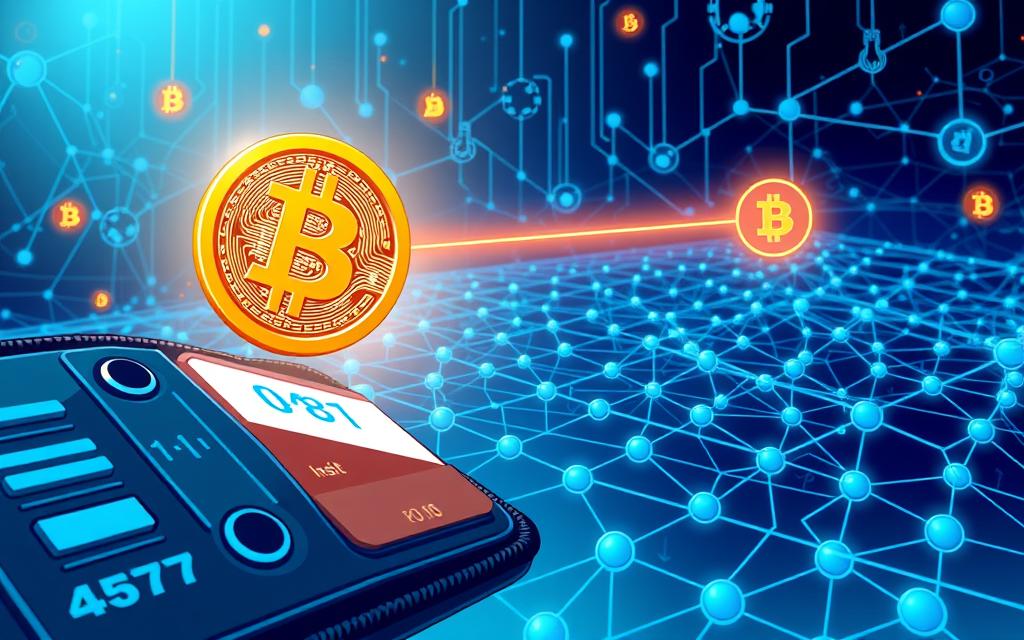Table of Contents
Bitcoin transactions differ significantly from traditional banking transfers. While both involve sending money from one place to another, the underlying mechanics are distinct. Bitcoin transactions require confirmation through the blockchain network, a process that isn’t instantaneous.
The blockchain verification process involves multiple confirmations, ensuring the transaction is secure and valid. Various factors can influence the duration of a Bitcoin transaction, making it essential for users to understand the process.
This article aims to provide a comprehensive understanding of Bitcoin transfer times, covering the transaction process, average confirmation times, factors affecting speed, and ways to expedite transactions. Whether you’re a beginner or an experienced user, this guide will address common questions and misconceptions about Bitcoin transaction speeds.
Understanding Bitcoin Transfers
To grasp the concept of Bitcoin transfers, it’s essential to delve into their underlying mechanics. Bitcoin transfers represent a fundamental aspect of the cryptocurrency, enabling users to send and receive value across the globe.
The Basic Components of a Bitcoin Transfer
A Bitcoin transaction consists of several key components: Input, Output, Amount, and Transaction Fee. The Input refers to the source of the coins, typically the sender’s Bitcoin address. The Output is the destination address, which belongs to the recipient. The Amount specifies the quantity of Bitcoin being transferred. Additionally, a transaction fee is paid to miners on the Bitcoin network to facilitate the transaction.
Bitcoins exist solely in the virtual realm as a series of transactions verified on the blockchain, a hyper-secure public ledger. This digital existence is fundamental to understanding how Bitcoin transfers operate, as there’s no physical coin or token to represent value.
How Bitcoin Transfers Differ from Traditional Banking
Bitcoin transfers differ significantly from traditional banking transactions. While banks rely on centralized institutions to process transactions, Bitcoin operates on a decentralized network. This allows for transactions to occur 24/7 without the constraints of banking hours or holidays. Moreover, once a Bitcoin transaction is confirmed on the blockchain, it is irreversible, unlike many traditional banking transactions which can be reversed under certain circumstances.
For those looking to understand the process of sending Bitcoin from various platforms, such as Venmo to Blockchain, detailed guides are available, like the one on how to send Bitcoin from Venmo to.
The Bitcoin Transfer Process Step by Step
To grasp how Bitcoin transactions work, it’s essential to break down the process into its fundamental components. A Bitcoin transfer involves several key steps, from initiation to final confirmation, ensuring secure and efficient transactions.
From Initiation to Confirmation
The sender initiates a Bitcoin transaction by specifying the recipient’s address, the amount to be transferred, and the transaction fee. Once the sender hits send, the transaction is broadcast to the Bitcoin network for validation. Validated transactions are added to a temporary waiting area known as the memory pool (mempool). Here, transactions await processing by miners.
The process of transaction verification is critical. Transactions with higher fees are typically prioritized by miners, who select them from the mempool and bundle them into a block. This prioritization is a key aspect of the Bitcoin network, as it incentivizes miners to process transactions efficiently.

The Role of Miners in the Transfer Process
Miners play a crucial role in the Bitcoin transfer process. They compete to solve complex mathematical problems, known as proof of work, to validate a block of transactions. The first miner to solve this problem gets to add the new block to the blockchain, thereby confirming all transactions within that block. This process not only secures the network but also ensures the integrity of each bitcoin transaction.
| Step | Description | Key Players |
|---|---|---|
| 1. Initiation | Sender creates a transaction specifying recipient’s address, amount, and fee. | Sender |
| 2. Validation | Transaction is broadcast to the network and validated. | Network Nodes |
| 3. Block Creation | Miners select transactions from mempool and bundle them into a block. | Miners |
| 4. Confirmation | Miner solves proof of work and adds block to blockchain. | Miners |
The number of confirmations a transaction receives further enhances its security. Multiple confirmations indicate that a transaction is deeply embedded in the blockchain, making it virtually irreversible. This process underscores the security and reliability of the Bitcoin network.
How Long Does it Take for Bitcoin to Transfer?
Understanding the timeframe for Bitcoin transactions is crucial for users looking to transfer funds efficiently. The duration of a Bitcoin transfer is primarily determined by the time it takes for a transaction to be confirmed on the blockchain.
Average Confirmation Times
The average confirmation time for a Bitcoin transaction is about 10 minutes, which is the time it takes to mine a new block. However, the total time for a transaction to be considered secure is typically much longer. Most exchanges and services require 6 confirmations, which can take around 1 hour on average, assuming a consistent block production rate.
“The Bitcoin network is designed to produce a new block approximately every 10 minutes,” as stated by Bitcoin’s protocol. However, actual confirmation times can vary significantly due to factors like network congestion.
What Counts as a “Completed” Transaction
A Bitcoin transaction is considered “completed” when it has been verified by miners and included in a block on the blockchain. However, the number of confirmations required for a transaction to be deemed fully secure can vary depending on the service or exchange being used.
For large transactions, waiting for 6 confirmations is a standard practice, which can take approximately 1 hour. Different services may have different requirements, so it’s essential to check their policies.
Why Confirmation Times Vary
Confirmation times can fluctuate due to several factors, including network congestion, transaction fee levels, and mining difficulty adjustments. During peak periods, when there’s a high volume of transactions, confirmation times can be significantly longer.
Network congestion occurs when there are more transactions than the network can process at a given time, leading to delays. Transaction fees also play a crucial role; higher fees incentivize miners to prioritize certain transactions over others.
As a result, users should be prepared for variable transaction times and plan accordingly, especially during times of high network activity.
Factors Affecting Bitcoin Transfer Speed
The efficiency of Bitcoin transactions depends on various factors that are worth examining. As the most popular cryptocurrency, Bitcoin’s network is subject to congestion, much like a traffic jam. This congestion affects how quickly transactions are processed.
Network Congestion and Traffic
Network congestion occurs when the volume of transactions exceeds the Bitcoin network’s processing capacity. During peak trading hours, the mempool becomes congested, leading to longer wait times for confirmations. The Bitcoin network is built to handle around 7 transfers per second, which is significantly less than traditional payment systems like Mastercard, which can handle around 5,000 transfers per second.

Transaction Fees and Miner Prioritization
Transaction fees play a crucial role in determining the priority of transactions. Miners prioritize transactions with higher fees, delaying those with lower fees. This creates a fee market during congested periods, where users are incentivized to pay higher fees to have their transactions processed quickly.
The relationship between transaction fees and processing priority is critical. As miners select higher-fee transactions first, users who are willing to pay more can expedite their transactions. This dynamic can lead to increased transaction costs during periods of high demand.
| Transaction Fee | Processing Priority |
|---|---|
| Low | Low |
| High | High |
Bitcoin’s Scalability Limitations
Bitcoin’s scalability limitations are a significant factor in its ability to process transactions efficiently. The 1MB block size limit and 10-minute block time constrain the network’s capacity. In theory, one block in the Bitcoin blockchain has a capacity of roughly 4MB, which limits the number of transactions that can be processed.
These scalability constraints create bottlenecks during periods of high demand, leading to variable and sometimes unpredictable transaction confirmation times. As the demand for Bitcoin transactions continues to grow, these limitations become increasingly apparent.
How to Speed Up Your Bitcoin Transfers
For users who need fast Bitcoin transactions, there are strategies to speed up the process. Bitcoin transaction times can be influenced by several factors, including network congestion and transaction fees.
Setting Appropriate Transaction Fees
One way to expedite a Bitcoin transaction is by setting an appropriate transaction fee. Miners prioritize transactions based on the fee attached to them. A higher fee increases the likelihood of a transaction being confirmed quickly.
To determine the optimal fee, users can utilize fee estimation tools provided by various wallets and blockchain explorers. These tools analyze current network conditions to suggest a fee that balances speed and cost.
Timing Your Transfers During Off-Peak Hours
Another strategy to speed up Bitcoin transactions is to transfer during off-peak hours when network congestion is low. By avoiding times of high network activity, users can reduce the likelihood of their transaction being delayed.
Blockchain explorers like blockchain.com provide a mempool size chart that shows when the number of unconfirmed transactions is at its lowest. Users can use this information to plan their transactions accordingly.
Using Transaction Accelerators
Transaction accelerators are services offered by some mining pools that allow users to prioritize their transactions. For a fee, these services can expedite the confirmation process, especially for transactions with low fees that might otherwise be stuck in the mempool.
| Method | Description | Benefits |
|---|---|---|
| Setting Higher Transaction Fees | Increasing the fee attached to a transaction to prioritize it | Faster confirmation times |
| Timing Transfers During Off-Peak Hours | Sending transactions when network congestion is low | Reduced likelihood of delays |
| Using Transaction Accelerators | Utilizing services offered by mining pools to prioritize transactions | Expedited confirmation process |

By understanding and utilizing these strategies, users can significantly improve the speed of their Bitcoin transactions. Whether it’s by adjusting transaction fees, timing transfers wisely, or leveraging transaction accelerators, there are multiple ways to expedite the process.
Alternative Solutions for Faster Bitcoin Transfers
The quest for faster Bitcoin transactions has driven the development of innovative alternative solutions. As the Bitcoin network continues to face scalability issues, users are looking for ways to expedite their transactions without incurring high fees.
One such solution is the Lightning Network, a layer-2 scaling solution designed to enable faster and cheaper transactions. The Lightning Network creates payment channels that allow for near-instant microtransactions, reducing the load on the Bitcoin network. By performing transactions off-chain, users can avoid the high fees associated with on-chain transactions. For more information on how the Lightning Network works, you can visit CoinCentral, which provides an in-depth explanation.
Lightning Network Explained
The Lightning Network is a decentralized system that enables users to make multiple transactions without recording each one on the Bitcoin blockchain. Instead, it records the final transaction, making it more efficient. However, the Lightning Network is not without its challenges. Users have reported issues such as failed transfers, security vulnerabilities, and a complicated transfer process. Despite these challenges, the Lightning Network remains a promising solution for faster Bitcoin transactions.

Other Cryptocurrencies with Faster Confirmation Times
Another alternative to Bitcoin’s slow transaction times is to use a different cryptocurrency that is known for faster transaction confirmations. Cryptocurrencies like Litecoin, Ethereum, and Bitcoin Cash offer faster transaction times due to their different consensus mechanisms or block parameters. For instance, Litecoin has a faster block time than Bitcoin, allowing for quicker transaction confirmations. Users looking for faster transaction times may consider using these alternative cryptocurrencies.
In conclusion, while the Lightning Network and other cryptocurrencies offer alternative solutions to Bitcoin’s transaction speed limitations, each comes with its own set of trade-offs. Users must weigh the benefits and drawbacks of each solution to determine the best fit for their needs.
Conclusion: Balancing Speed, Cost, and Security in Bitcoin Transfers
The time it takes for a Bitcoin transaction to complete is variable, dependent on network conditions and transaction fees. On average, it takes around 10 minutes for a transfer to be confirmed on the blockchain. However, this duration can fluctuate based on factors such as network congestion and the fee attached to each transfer.
Users must balance the need for speed with the cost of transactions. Higher fees generally result in faster confirmations, but this relationship varies with network conditions. The Bitcoin ecosystem continues to evolve, offering solutions aimed at improving transaction times. By understanding these dynamics, users can make informed decisions based on their specific needs.
FAQ
What is the average time for a Bitcoin transaction to be confirmed?
The average confirmation time for a Bitcoin transaction is around 10 minutes, which is the time it takes for a new block to be added to the blockchain. However, this time can vary significantly due to factors like network congestion and transaction fees.
How do transaction fees affect the speed of Bitcoin transfers?
Transaction fees play a crucial role in determining the speed of Bitcoin transfers. Miners prioritize transactions with higher fees, so setting a higher transaction fee can result in faster confirmation times. Conversely, lower fees may lead to longer waiting times.
What is the Lightning Network, and how does it impact Bitcoin transfer times?
The Lightning Network is a second-layer scaling solution for Bitcoin that enables faster and cheaper transactions. By allowing users to make multiple transactions off-chain and then settle them on the blockchain in a single transaction, the Lightning Network can significantly reduce transfer times and fees.
Can network congestion cause delays in Bitcoin transfers?
Yes, network congestion can cause significant delays in Bitcoin transfers. When the network is congested, there are more transactions waiting to be processed than there are available slots in the next block, leading to longer confirmation times.
Are there other cryptocurrencies with faster confirmation times than Bitcoin?
Yes, several cryptocurrencies have faster confirmation times than Bitcoin. For example, some cryptocurrencies have implemented more efficient consensus algorithms or have larger block sizes, allowing for more transactions to be processed per block.
How can I speed up my Bitcoin transfers?
To speed up your Bitcoin transfers, you can set a higher transaction fee, time your transfers during off-peak hours when the network is less congested, or use a transaction accelerator service that can help prioritize your transaction.
What counts as a "completed" Bitcoin transaction?
A Bitcoin transaction is considered “completed” when it has been confirmed by the network and included in a block on the blockchain. The number of confirmations required for a transaction to be considered secure can vary depending on the recipient’s requirements.









